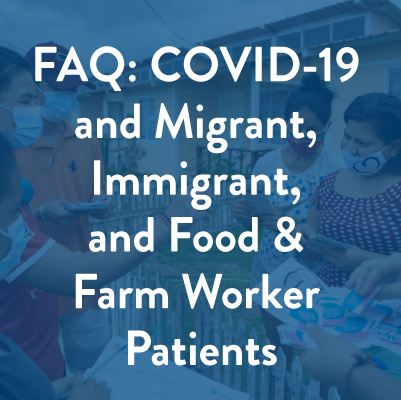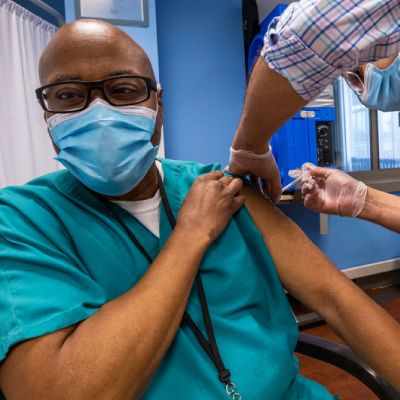- Who We Are
- Clinician Employment
- Publications
- Witness to Witness (W2W)
- Kugel & Zuroweste Health Justice Award
- Your Voice Matters: Photovoice Project
Wed, 09/15/2021 | by MCN Admin


Heat stress kills food and farmworkers – and every heat-related illness that these workers experience can be prevented. Maryland Occupational Safety and Health (MOSH) is drafting a much-needed standard requiring employers to protect Maryland workers from heat-related illnesses, starting next year. During an agency hearing, Leslie Rodriguez, JD, Bilingual Program Manager for Environmental and Occupational Health, provided Migrant Clinicians Network’s comments on the new standard.
“The workers most vulnerable to heat illnesses are those that work outside, are socially isolated, economically disadvantaged, have chronic illnesses, are part of certain communities of color, and are migrants,” Rodriguez said. “The demographic that meets most if not all those criteria are farmworkers, specifically migrant farmworkers.”
Farmworkers’ risk of dying from heat exposure is 20 times higher than for workers in other industries. As the climate crisis intensifies and continues to increase the number of heat events, farmworkers’ health will be further jeopardized. But this is not a future concern; the number of extremely hot days has already increased, and workers are dying every year.
“We are seeing a crisis on the ground and we can’t afford to wait,” said Liebman in a news article in the Journal of the American Medical Association (JAMA), Why Farmworkers Need More Than New Laws for Protection From Heat-Related Illness. Liebman pointed to California, where one study found that heat-related illnesses declined by 30% after the state implemented its heat standard in 2005. Maryland has an opportunity to prevent serious illnesses as well.
MCN’s comments at the Maryland hearing, which outlined numerous recommendations that are largely in line with the California heat standard, included paid rest breaks that increase as the temperature does, annual culturally competent trainings, water provision, and acclimatization guidance.
Both the Maryland testimony and the recent JAMA news article frequently refer to MCN’s Heat-Related Illness Clinicians’ Guide from this summer. The guide, available in English and Spanish, provides information to clinicians on the prevention and treatment of heat-related illness, but can also assist legislators and the general public in understanding the severity and at times complexity of heat-related illness.
“It’s not just temperature,” noted Liebman. “Workers are coming to work already dehydrated, studies are finding. That increases their risk.” With unconditioned housing, workers may not be able to stay cool at night, leading to dehydration in the mornings. Some lack easy access to clean potable water in their homes. Once they arrive at work, many are paid piece-rate, which discourages workers from taking time for rest and bathroom breaks, which further discourages water consumption. Workers may be discouraged by employers or contractors to take time to rest in the heat, and workers may feel that issuing a complaint may jeopardize their job. These are just a few examples of how heat stress is not simply a result of high temperatures, but a confluence of determinants that limit workers’ ability to avoid heat stress when state or federal regulations do not protect them.
“What we really need is a national heat standard to protect workers,” Liebman said after the Maryland hearing. “Statewide measures are important, and we want to see a strong Maryland heat standard. But a haphazard, piecemeal approach to worker safety is problematic. Heat is a deadly hazard, a hazard that will only intensify along with our climate crisis. And all workers deserve protection, regardless the state.”
Read Migrant Clinicians Network’s full testimony, written by Amy K. Liebman, MPA, Leslie Rodriguez, JD, and Jenna Feinauer, in its entirety here.
Got some good news to share? Contact us on our social media pages above.
Return to the main blog page or sign up for blog updates here.







